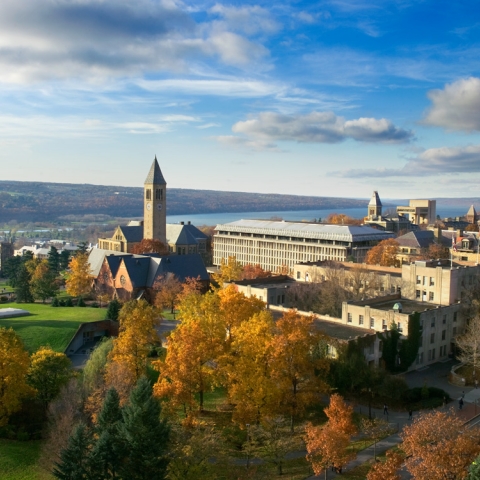
By Sarah Brylinsky | September 9, 2019
Original source
Cornell has a long history of commitment to sustainability: In 1985, it launched its Energy Conservation Initiative; in 2007, it became the first Ivy League institution to embrace a goal of carbon neutrality; this year, Cornell was ranked first among the Ivies in national sustainability ratings by the Princeton Review.
In an effort to maintain and strengthen its role as a sustainability exemplar, Cornell is announcing a new initiative to oversee campus sustainability and climate leadership goals and projects.
The Sustainable Cornell Council (SCC) will direct and coordinate Cornell’s role as an international leader in addressing climate change and promoting sustainability by using the campus as a living laboratory and seeking regional and global partnerships to accelerate impact. The SCC will report to the provost and will provide progress updates to the Cornell community.
The SCC replaces two existing committees: The President’s Sustainable Campus Committee (PSCC), which oversaw sustainability activities since 2010; and the Senior Leaders Climate Action Group (SLCAG), which managed high-level carbon neutrality projects, including development of Earth Source Heat, since 2015.
“I am grateful for the dedicated efforts of the PSCC and SLCAG members, some of whom will remain engaged in the new Sustainable Cornell Council,” Provost Michael Kotlikoff said. “Their leadership in this area has allowed Cornell to achieve tremendous progress in campus sustainability efforts, and I believe the launch of this new initiative will provide stronger focus and better coordination.”
The SCC comprises three steering committees that will prioritize activities in specific areas and will work to engage broad participation from the campus community:
- The Carbon Neutral Campus Committee will advance the university’s Climate Action Plan toward the goal of carbon neutrality for the Ithaca campus by 2035.
- The Campus Operations Committee will advance sustainability across campus operations, including food; land and water; buildings and energy; and materials management.
- The Education and Engagement Committee will promote the adoption of sustainable behaviors and advance sustainability and climate literacy opportunities for students, faculty and staff.
Each steering committee will include an appointed representative from both the University Assembly and the student Environmental Collaborative, as well as membership from the broader Cornell community.
The committees will be guided by a leadership council chaired by Rick Burgess, vice president for facilities and campus services, and Lance Collins, the Joseph Silbert Dean of Engineering.
“The new council will more effectively focus engagement of the entire community, including our senior leadership, to capitalize on the strengths and talents of our faculty, students and staff for greatest impact,” Burgess said.
Leadership council members are:
- Bert Bland, associate vice president for energy and sustainability (co-chair, Carbon Neutral Campus Committee)
- Rick Burgess, vice president for facilities and campus services (co-chair, Campus Operations Committee)
- Lance Collins, the Joseph Silbert Dean of Engineering (co-chair, Carbon Neutral Campus Committee)
- David Lodge, director, Atkinson Center for a Sustainable Future
- Joel Malina, vice president for university relations
- Katherine McComas, vice provost for engagement and land-grant affairs (co-chair, Education and Engagement Committee)
- Lisa Nishii, vice provost for undergraduate education (co-chair, Education and Engagement Committee)
- Paul Streeter, vice president for budget and planning
- Pat Wynn, assistant vice president for student and campus life (co-chair, Campus Operations Committee)
- Sarah Zemanick, director of the campus sustainability office
For more information, visit the Sustainble Cornell Council page.
Sarah Brylinsky is the sustainability communications and integration manager for the Campus Sustainability Office.
